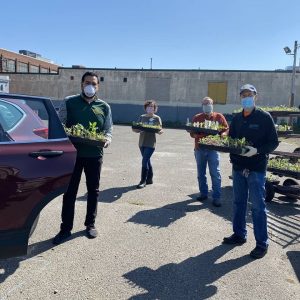
As temperatures soar to 100+ degrees in cities across the country low-income families will have to make difficult choices – turn on the air conditioner and expect an astronomical utility bill or sweat it out and risk a host of heat-related illnesses; spend the day in the air-conditioned senior center or stay at home and maintain social distance? High heat is the number one weather-related killer in the United States – topping hurricanes, wildfires, and tornados. And, formerly redlined communities are more vulnerable than their wealthier neighbors. With a high proportion of pavement and parking lots and a shortage of green spaces, the neighborhoods least able to afford the social, economic, and health costs of extreme weather are the most burdened by the consequences.
This year, with the constant threat of COVID-19 outbreaks, our usual ways of combatting the high heat come with increased risks. With limited access to libraries, senior centers, and swimming pools, a pressing question looms – how can we affordably keep our neighbors cool this summer?
This question has been on Jackie Park Albaum’s mind as the summer months begin to heat up. As the Climate Safe Neighborhoods coordinator for Groundwork Elizabeth (GWE), Jackie has spent the past two years raising awareness about the impact of redlining and housing discrimination on the disproportionate vulnerability to urban heat islands and increased flooding risk. To address this inequity, she’s bringing together a diverse coalition of stakeholders to form the Climate Safe Elizabeth Task Force, a network of over 150+ community members committed to raising awareness about environmental injustices and the climate resiliency policies and programs necessary to address them.
At the start of the year, it looked like this summer was going to be especially exciting for Groundwork Elizabeth and the Climate Safe Task Force. A new municipal plan was going to be signed on July 1 that would finally recognize the lingering impact of redlining and prioritize green infrastructure for the hardest-hit neighborhoods in Elizabeth – the first major policy win for the Task Force.
Then the pandemic hit.
The #Everybodygetsagarden campaign

With social distancing requirements extending into the summer, the municipal planning process was put on hold until the fall. At the same time, Jackie became increasingly worried about how the most vulnerable residents of Elizabeth were going to survive the compounding effects of the pandemic on food insecurity and urban heat islands. Not one to sit on the sidelines and let others find solutions, Jackie reevaluated and pivoted her projects to address the most pressing needs of the community this summer. The #EverybodyGetsAGarden campaign was born.
Though the #everybodygetsagarden campaign, Groundwork Elizabeth is distributing over 20,000 seedlings from their greenhouse along with basic gardening supplies to provide the community with a socially distant way to get outside. With an increased interest in, and need for, homegrown food – Groundwork Elizabeth was able to reach an expanded group of stakeholders even as the pandemic limited in-person community engagement efforts.
As people stop by to pick up their plants, they are asked to take the Climate Safe Elizabeth pledge – pledging to protect the environment and leave the world a better way than they found it – and to join the Climate Safe Elizabeth Task Force. Groundwork Elizabeth is also using this as an opportunity to check in on heat-related concerns (e.g. Do you have an air conditioner at home? Do you anticipate struggling to pay your electricity bills this summer? What do you need in order to stay cool?) – and crowdsource ideas for staying cool.
Staying cool during COVID
What are they learning through their outreach? Focusing solely on air conditioner exchanges and utility relief is not enough to protect our most vulnerable neighbors. Even under the best circumstances, many families and seniors struggle to afford the costs of running their air conditioners a few hours a day. With more people at home for longer hours, the cost of running air conditioners all day is prohibitive – even with targeted assistance programs. We need to think about low energy ways to keep people cool.
Groundwork Elizabeth is activating their Task Force the summer to find these options and spread the word about available opportunities. In partnership with the Elizabeth Housing Authority, Task Force members will be advocating for municipal support for cooling solutions – like utility cost relief, air conditioner swaps, and fan purchases – and educating residents in the hottest communities on small changes that can reduce the heat inside – everything from the best times to open the windows and shades, and reducing the impact of cleaning products, candles, and air fresheners on indoor air quality. They are also thinking about more creative solutions from popsicle distribution to sprinkler exchanges. The list of ideas is long and the Climate Safe Elizabeth Task Force will be exploring what works best all summer long.
This summer is going to put a strain on all the systems that shape community well-being – health, transportation, food – and will require out of the box thinking to find ways the bring down the temperatures. Groundwork Elizabeth’s #everybodygetsagraden campaign exemplifies the community-led multi-system collaborations that will not only help our communities bridge the most pressing crises this summer but enable us to bridge to a more sustainable and equitable future.
Interested in joining the Climate Safe Elizabeth Task Force? Sign the Climate Safe Elizabeth pledge today!
